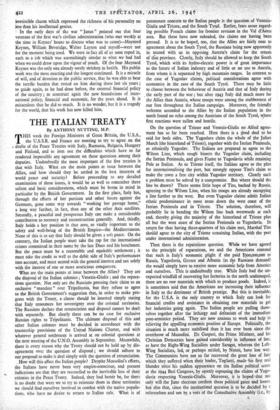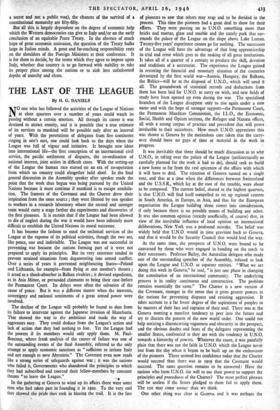THE ITALIAN TREATY
By ANTHONY NUTTING, M.P.
THIS week the Foreign Ministers of Great Britain, the U.S.A., the U.S.S.R. and France are meeting to try to agree, on the . drafts of the Peace Treaties with Italy, Rumania, Bulgaria, Hungary and Finland, and to iron out the difficulties which have so far rendered impossible any agreement on these questions among their deputies. Undoubtedly the most important of the five treaties is that with Italy. What are the main points at issue between the Allies, and how should they be settled in the best interests of world peace and security? Before proceeding to any detailed examination of these issues, it would be as well to remember three salient and basic considerations, which must be borne in mind in particular by the British Government. In the first place, Italy has, through the efforts of her partisan and other forces against the Germans, gone some way towards " working her passage home," a long way further, in fact, than any of the other Axis satellites. Secondly, a peaceful and prosperous Italy can make a considerable contribution to recovery and reconstruction generally. And, thirdly, Italy holds a key position in that area, so vitally important to the safety and well-being of the British Empire—the Mediterranean. None of this is to say that Italy should be given a soft peace. On the contrary, the Italian people must take the rap for the international crimes committed in their name by the late Duce and his henchmen. But the peace must be a reasonable and equitable settlement ; it must take the credit as well as the debit side of Italy's performances into account, and must accord with the general interest and not solely with the interest of one or more avaricious conquerors.
What are the main points at issue between the Allies? They are the disposal of the Italian colonies ; Venezia-Giulia ; and the repara- tions question. Not only are the Russians pressing their claim to an exclusive " mandate " over Tripolitania, but they refuse to agree to the British Government's suggestion that, in order to make pro- gress with the Treaty, a clause should be inserted simply stating that Italy renounces her sovereignty over the colonial territories. The Russians declare that renunciation and disposal cannot be dealt with separately. But clearly there can be no case for exclusive Russian rights to Tripolitania. The ultimate disposal of this and other Italian colonies must be decided in accordance with the trusteeship provisions of the United Nations Charter, and with whatever general settlement is arrived at on colonial questions at the next meeting of the U.N.O. Assembly in September. Meanwhile, there is every reason why the Treaty should not be held up by dis- agreement over the question of disposal ; we should adhere to our proposal to make it deal simply with the question of renunciation.
How will this affect the Italian people? Despite Mussolini's efforts, the Italians have never been very empire-conscious, and present • indications are that they are reconciled to the inevitable loss of their colonies in the Peace Treaty. Indeed, they had better be, for there is no doubt that were we to try to reinstate them in these territories we should find ourselves involved in combat with the native popula- tions, who have no desire to return to Italian rule. What is of paramount concern to the Italian people is the question of Venezia- Giulia and Trieste, and the South Tyrol. Earlier, fears arose regard- ing possible French claims for frontier revision in the Val d'Aosta area. But these have now subsided, the claims not having been pressed. It is to be hoped, too, that the Allies are fairly near to agreement about the South Tyrol, the Russians being now apparently in accord with us in opposing Austria's claim for the return of that province. Clearly, Italy should be allowed to keep, the South Tyrol, which with its hydro-electric power is of great importance to the future of Italian industry and of little or no use to Austria, from whom it is separated by high mountain ranges. In contrast to the case of Yugoslav claims, political considerations agree with economics in the case of the South Tyrol. There may be little to choose between the behaviour of Austria and that of Italy during the early part of the war ; but after 5943 Italy did much more for the Allies than Austria, whose troops were among the stubbornest of our foes throughout the Italian campaign. Moreover, the friendly welcome accorded to the Allies by the Italian population in the north found no echo among the Austrians of the South Tyrol, whose first reactions were sullen and hostile.
On the question of Trieste and Venezia-Giulia no Allied agree- ment has so far been reached. Here there is a good deal to be said for both sides. The Yugoslays claim the whole of the Julian March (the hinterland of Trieste), together with the Istrian Peninsula, as ethnically Yugoslay. The Italians are prepared to agree to the Wilson Line, which rough bisects the Yugoslav claim, including the Istrian Peninsula, and gives Fiume to Yugoslavia while retaining Pola as Italian. As to Trieste itself, the Italians agree to the plan for internationalising the port, but strongly oppose Tito's claim to make the town a free city within Yugoslav territory. Clearly such a problem must be solved by a compromise. But where. should the line be drawn? There seems little hope of Tito, backed by Russia, agreeing to the Wilson Line, when his troops are already occupying a line further to the west. But even Yugoslav claims adniit Italian ethnic predominance in most areas down the west coast of the Istrian Peninsula and in Trieste. The solution, therefore, will probably lie in bending the Wilson line back westwards at each end, thereby giving the majority of the hinterland of Trieste plus all but the west coast of the Istrian Peninsula to Yugoslavia. In return for thus having three-quarters of his claim met, Marshal Tito should agree to the city of Trieste remaining Italian, with the port under international administration.
Then there is the reparations question. While we have agreed to the principle of reparations, we and the Americans contend that such is Italy's economic plight if she paid $3oo,000,000 to Russia, Yugoslavia, Greece and Albania (as the Russians demand) she would simply have to receive more economic help from America and ourselves. This is undoubtedly true. While Italy had the un- expected windfall of recovering her factories in the north undamaged, there are no raw materials with which to produce goods. Indeed, it is sometimes said that the Americans are increasing their influence in Italy to the detriment of British prestige. But this is inevitable, for the U.S.A. is the only country to which Italy can look for financial credits and assistance in obtaining raw materials to get her industries going again. The Italian people are pulling them- selves together after the lethargy and defeatism of the immediate post-armistice period. They are now anxious to work and help in relieving the appalling economic position of Europe. Politically, the situation is much more stabilised than it has ever been since the overthrow of Mussolini. De Gasperi, the Prime Minister, and his Christian Democrats have gained considerably in influence of late, as have the Right-Wing Socialists under Saragat, whereas the Left- Wing Socialists, led, or perhaps misled, by Nenni, have lost way. The Communists have, not so far recovered the great loss of face which they suffered when their leader, Togliatti, made 'his first real blunder since his sudden appearance on the Italian political scene at the 1944 Bari Congress, by openly espousing the claims of Yugo- slavia respecting Venezia-Giulia. Moreover, it is hoped•that not only will the June elections confirm these political gains and losses, but also that, since the institutional question is to be decided by a referendum and not by a vote of the Consultative Assembly (i.e., by
a secret and not a public vote), the chances of the survival of a constitutional monarchy are fifty-fifty.
But all this is largely dependent on the degree of economic help which the Western democracies can give to Italy and/or on the early conclusion of an equitable Peace Treaty. In the absence of much hope of great economic assistance, the question of the Treaty bulks large in Italian minds. A great and far-reaching responsibility rests on the shoulders of the Foreign Ministers at their conference. It is for them to decide, by the terms which they agree to impose upon Italy, whether that country is to go forward with stability to take its proper place among the nations or to sink into unfathomed depths of anarchy and chaos.



























 Previous page
Previous page